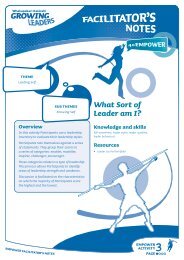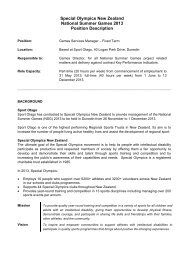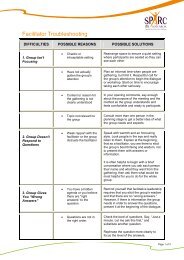Read Getting Set for an Active Nation - Sport New Zealand
Read Getting Set for an Active Nation - Sport New Zealand
Read Getting Set for an Active Nation - Sport New Zealand
Create successful ePaper yourself
Turn your PDF publications into a flip-book with our unique Google optimized e-Paper software.
period has been observed by some sport sociologists as having increasingly capitalistic <strong>an</strong>d<br />
democratic values such as the division of labour, discipline, constitutions, meetings, thrift,<br />
subscriptions, s<strong>an</strong>ctions <strong>an</strong>d assigned duties. In the cities, the provision of facilities such as<br />
the Auckl<strong>an</strong>d Domain in 1890 <strong>an</strong>d support of team sports was a practical me<strong>an</strong>s toward the<br />
org<strong>an</strong>isation of spare time <strong>an</strong>d the influencing of social values about recreation <strong>an</strong>d sport.<br />
The nineteenth century closed with major sports consolidating their org<strong>an</strong>isation <strong>an</strong>d male<br />
sports dominating national associations, sporting columns <strong>an</strong>d resources. Despite this,<br />
women preceded the men in introducing hockey, basketball <strong>an</strong>d baseball. Outdoor women’s<br />
basketball ch<strong>an</strong>ged to netball <strong>an</strong>d this became the domin<strong>an</strong>t sport <strong>for</strong> women <strong>an</strong>d with more<br />
clubs affiliated to its governing body th<strong>an</strong> <strong>an</strong>y of its male counterparts. At that time <strong>New</strong><br />
Zeal<strong>an</strong>d horses were experiencing success in Australia’s prestigious Melbourne Cup <strong>an</strong>d a<br />
decrease in violent blood sports, such as coursing with live hares <strong>an</strong>d live pigeon shooting had<br />
become increasingly evident.<br />
Into the Twentieth Century<br />
Rugby, first played in Nelson in 1870, assumed increasing prominence in the early years of<br />
twentieth century <strong>New</strong> Zeal<strong>an</strong>d. The 1888-89 <strong>New</strong> Zeal<strong>an</strong>d Natives team, primarily comprised<br />
of Maori players, was the first <strong>New</strong> Zeal<strong>an</strong>d sports team to tour the British Isles. The 1905<br />
“Originals” national team who toured the British Isles became known as the “All Blacks”<br />
because of their black jerseys. These words became elevated to the realm of national sport<br />
mythology. Rugby’s entrenchment as the perceived national game was enh<strong>an</strong>ced by the<br />
political recognition <strong>an</strong>d public support accorded that particular team. This sport has,<br />
arguably, more th<strong>an</strong> <strong>an</strong>y other <strong>for</strong>m of recreation <strong>an</strong>d sport, been the focus of national<br />
attention, debate, media attention <strong>an</strong>d <strong>an</strong> echo of the <strong>New</strong> Zeal<strong>an</strong>d voice. The virtues of<br />
rugby were lauded in similar terms as the qualities of <strong>New</strong> Zeal<strong>an</strong>ders at war, reflecting a<br />
“moral, imperial, highly structured <strong>an</strong>d highly gendered” model of physical recreation (Phillips,<br />
2000, p.3).<br />
Recreation activities such as tramping, hunting <strong>an</strong>d fishing developed club structures after<br />
World War I. In 1913 the noted climber Freda Du Faur made the Gr<strong>an</strong>d Traverse of Mt Cook.<br />
In the same broad period there was local government recognition of leisure <strong>an</strong>d sport with the<br />
establishment of community facilities. At the national level, the advent of the YMCA (1855)<br />
<strong>an</strong>d YWCA (1878), Boys’ Brigade (1889), Boy Scouts (1908), Girl Guides (1923) <strong>an</strong>d Girls’<br />
Brigades (1928), fostered <strong>an</strong> emphasis upon healthy physical activity <strong>an</strong>d associated moral<br />
virtues, particularly that of “playing the game”. Be<strong>for</strong>e World War I the national school<br />
curriculum had sport <strong>an</strong>d physical drills securely established with <strong>an</strong> emphasis upon perceived<br />
values <strong>an</strong>d <strong>for</strong>mative experiences of team play. A survey of <strong>New</strong> Zeal<strong>an</strong>d school readers<br />
supplied by the Education Department reveals tales of English public schools, where “chaps”<br />
played “rugger” <strong>an</strong>d cricket. The exposure of young Kiwi people to moral <strong>an</strong>d sporting values<br />
espoused at school fashioned m<strong>an</strong>y lasting attitudes in adults. Along with <strong>an</strong> exhortation to<br />
“play the game of Empire” in School Journals were comments that “As British people we love<br />
fair play” <strong>an</strong>d “Life itself is a game, <strong>an</strong>d by playing it unselfishly, honourably <strong>an</strong>d nobly we<br />
shall be carrying out the wishes of our Great Captain” (Cited in Jenkins, 1939, p.5). Moral<br />
exhortations included the ultimate sport metaphor, urging young <strong>New</strong> Zeal<strong>an</strong>ders to “always<br />
be ready to sacrifice ourselves <strong>for</strong> the good of the side” (ibid). Later years rein<strong>for</strong>ced the<br />
same sport morality links which are redolent of espoused beliefs found in nineteenth century<br />
British schools. <strong>New</strong> Zeal<strong>an</strong>ders of British descent continued to often refer to Engl<strong>an</strong>d as<br />
Ministerial Task<strong>for</strong>ce on <strong>Sport</strong>, Fitness & Leisure J<strong>an</strong>uary 2001 page 19 of 153
















